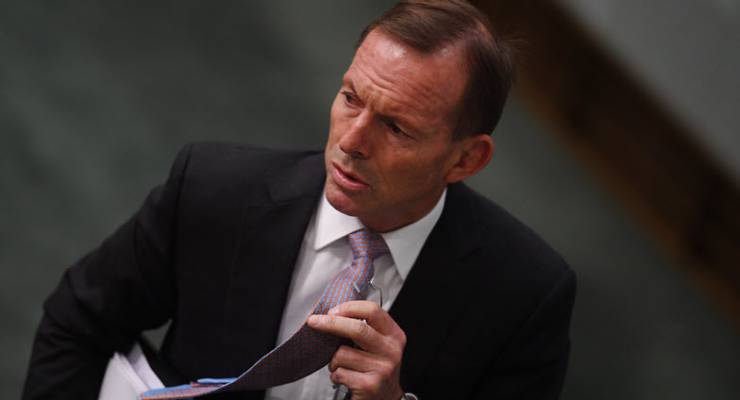
Lost amid all the culture war hubbub about the Ramsay Centre for Western Civilisation being turned down by the Australian National University was this little gem: Tony Abbott, not so long ago, had been ready to walk away from parliament and dial up his conservative agitation as the chief executive of the now homeless centre.
Originally, the plan for the Ramsay Centre was to follow the model of the Rhodes Scholarship, since copied by the Fulbright Scholarship, the Gates Cambridge Scholarship et al. The appeal to Abbott of Anglo-supremacist Cecil Rhodes is in plain view — but like many organisations spending other dead people’s money, the centre began expanding its ambitions.
It is unlikely that Abbott, who effectively nixed the ANU deal via a Quadrant piece, would be smart enough do it deliberately or brazen enough to stymie the centre’s chairman, John Howard. We all know by now Abbott had been friends with the late Paul Ramsay, who bequeathed a $3 billion fortune to the Paul Ramsay Foundation from which the centre would be funded. The pair were also thick, as Abbott still is, with Tony Clark, one time head of KPMG in NSW before riding his Liberal and Catholic connections into the boardrooms of corporate Australia.
Clark was also famously Howard’s golfing partner. Together they were the unofficial “get Abbott a job” team during late 2015 and early 2016. It was during this time Abbott was agitating for the Ramsay Centre job but was firmly told no by his Liberal buddies, they needed someone with an academic background. Clark, who in his semi-retirement now runs, inter alia, hotels in Armidale, part of the seat of New England that former Deputy Prime Minister Barnaby Joyce.
As Abbott himself said in Quadrant, Ramsay, near the bottom of his class at Abbott’s alma mater St Ignatius College in Sydney, was “not an organisational expert; not an intellectual giant; not an impresario of ideas; and not a financial genius”.
Others who knew Ramsay agreed this had some truth to it but that this was (typically) Abbott over-egging the pudding. They also pointedly noted Ramsay was a very canny businessman who knew a good opportunity when he saw one. One of the keys to his growing fortune, came, ironically during the Keating government when the then-minister for veterans affairs Ben Humphreys decided to sell off Australian last remaining veterans hospitals that helped underpin Ramsay Health Care’s successful $2 billion listing on the then Australian Stock Exchange.
When Ramsay was dying, he had to decide what to do with his fortune as he had no heirs. Ramsay chose the anti-gay marriage Clark as one of the three original administrators of the Ramsay Foundation. They were both Riverview boys, along with chairman Michael Siddle, a Ramsay Health Care employee since 1968, and his colleague Paul Evans, who had been with Ramsay since 1969. Ramsay’s whole business was built on relationships.
Clark has been on the board of Ramsay Health Care since 1998, two years after John Howard’s first communications minister Richard Alston appointed him to what ended up being a nearly 10-year directorship of Telstra, seeing the company through its first two tranches of privatisation.
Since Ramsay’s death in 2014, the board of the foundation has been expanded, there are even a couple of (old, white) women on it: former Sydney Liberal Party counselor Kathryn Greiner, and lawyer turned serial ASX board director Ilana Atlas. They joined a clutch of other old white men: McKinsey consulting veteran Robert McLean, former Macquarie banker Michael Traill, and longtime charities administrator Greg Hutchinson.
Clark, Siddle and Evans are the only three people who are on both the Ramsay Centre and Ramsay Foundation boards, but Crikey hears there’s trouble on the boards of the multibillion-dollar philanthropic empire paradise. Clark quit the Liberal Party in disgust when Abbott was rolled by Turnbull and has now joined the Nats. Clark and Siddle are the two major — and apparently long-time — protagonists.
Tony Abbott, one imagines, is surely not helping.








Is there anything that can’t be screwed up by Tony Abbott’s active involvement?
The Lets love biking fraternity?
Has he started a popcorn franchise yet?
Consider your comment to be ‘liked’, DF.
This is the first time I’ve ever been informed by this author.
Still his usual cut’n’paste but nothing of which I was previously aware.
Ta, muchly.
In two sentences you managed to contradict yourself??
…? Stet.
Like following the mould through a Gorgonzola?
Apt description neither is Tony Abbott “not an organisational expert; not an intellectual giant; not an impresario of ideas; and not a financial genius”.
This should have been obvious in his previous portfolios – one of the worst Health Ministers following a process of really bottom of the barrel appointments.